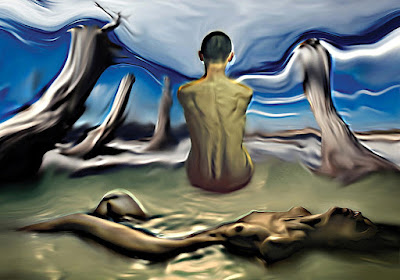Moving on, relating to posts here from @Crazywaterspring and @PrincessOfHell, I find that the origins of all our World's Faith Traditions are shrouded in mist and cloud. Difficult to truly know just who or what copied from who else. What I would say is that the presumed power of Satan has grown and grown in many christian imaginations until he has become virtually as powerful as God Himself!
Those same imaginations are those who speak more of fear, guilt and damnation than of love, even sometimes appearing to relish thinking of the fate of the damned. Such Good News! For such "good news" to have substance they must first proclaim the Bad, their game given away in the words of the famous hymn, "Amazing Grace":-
Twas grace that taught my heart to fear and grace my fears removed.
First the bad, then the good. Yet what is changing here?
The Old Testament speaks of a God whose "mercy endures forever" and more, the Bible reports God as proclaiming :- "For I the Lord do not change".
This all points to an understanding and a knowledge of God (or Reality-as-is) as the one constant. Acknowledged in the East and the West:-
My eyes being hindered by blind passions,
I cannot perceive the light that grasps me;
Yet the great compassion, without tiring,
Illumines me always
(Shinran, from "Hymns of the Pure Land Masters")
And Julian of Norwich, who wrote her "Revelations of Divine Love", speaking here on the same theme......
If there be anywhere on earth a lover of God who is always kept safe, I know nothing of it, for it was not shown to me. But this was shown: that in falling and rising again we are always kept in that same precious love.
In zen the 13th century zen guy Dogen, in his "Genjokoan" , comes down to the mechanics, with his allusions of shore and boat, in his usual poetic style. That it is the boat we are in that moves, creating the illusion that it is the shore. To become still and receptive is the key:-
Be still and know that I Am God
Whatever, as Dogen says, "we are what we understand", which is quite profound, encompassing many things including karma..."we ARE our karma".
As I see it, becoming still is paradoxically to move forward, but in the sense of allowing the "myriad things" to reflect in us, for us to then reflect them back upon our fragile world. True freedom is only to be found in God, Reality-as-is, not in our own petty choices. In unity, in reflecting, we find our freedom. In a constant advance unto novelty. Truly moving at last.
Yet as Dogen - again - says, whatever our understanding, shallow of profound, nevertheless flowers fade even though we love them, weeds grow even though we dislike them.
"There is a crack in everything
That's how the light gets in"
May true Dharma continue.
Be kind. No blame. Love everything.











.jpeg)
.jpeg)
.jpeg)

.jpeg)
.jpeg)
.jpeg)

.jpeg)




